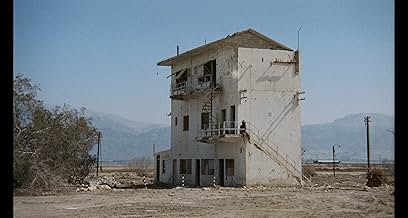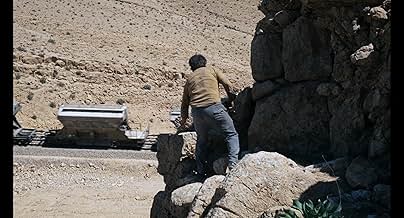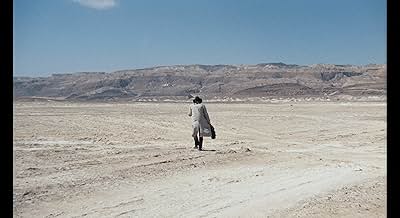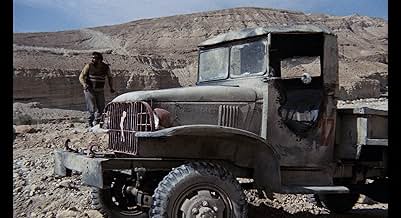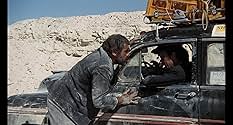PUNTUACIÓN EN IMDb
6,5/10
1,6 mil
TU PUNTUACIÓN
Añade un argumento en tu idiomaIn a deserted mining town in the middle of nowhere, three desperate men fight over a suitcase full of cash.In a deserted mining town in the middle of nowhere, three desperate men fight over a suitcase full of cash.In a deserted mining town in the middle of nowhere, three desperate men fight over a suitcase full of cash.
- Premios
- 1 nominación en total
Anthony Dawson
- Anthony Sunshine, der alte Killer
- (as Antony Dawson)
Mascha Rabben
- Jessy, das Mädchen
- (as Mascha Elm-Rabben)
Siegurd Fitzek
- Enzo, der elende Schnüffler
- (as Sigurd Fitzek)
Arnold Marquis
- Sunshine
- (voz)
- (sin acreditar)
Dieter Schönemann
- Train Conductor
- (sin acreditar)
Reseñas destacadas
In 1970, it seems as if Roland Klick set out to emulate Sergio Leone's "The Good, The Bad, And The Ugly", mixing it with Michelangelo Antonioni's "Zabriskie Point" to create a modern Sauerkraut Western (without horses, but rather a truck and a car). The story stars three characters, Marquard Bohm as the "Kid" (The Good), Siegurd Fitzek as "Mr. Sunshine" (The Bad), and Mario Adorf (can be seen in Dario Argento's "The Bird With The Crystal Plumage" as the reclusive cat eating painter) as "Mr. Dump" (The Ugly) (who again plays a reclusive man who lives in a dump??). The story begins with the Kid, who has just pulled off a heist (with a bullet wound in the arm), and is carrying millions of dollars in a case. Wandering aimlessly through the sunbaked desert, (he finally passes out and is left for dead) until Mr. Dump drives along and finds him and the money. Once back at Mr. Dump's residence (a sort of abandoned junk yard), the Kid warns Mr. Dump, that Mr. Sunshine (who apparently is the ringleader of this heist) will be coming for his money. Thus begins the cat and mouse story, of who will get the case of money. Mr. Dump also has two neighbors, an older (and apparently sexually crazy) woman and her pretty (but feral) daughter (who is obviously sexually curious of the Kid).
The film is set in (what looks to be) a wasteland desert, which could have been a forerunner for films like "A Boy And His Dog" and "Road Warrior". Yet the film maintains a complete Sergio Leone feel to it. You get all the great close ups of the characters sweating in the sun, and the typical double crossing that took place in his westerns. The Kid in this movie also kind of resembles Charles Bronson's character in Leone's other masterpiece "Once Upon A Time In The West". But on the flipside, this film also kind of reminded me of Antonioni's "Zabriskie Point", in the surreal desert filming. Also the use of Kraut Rock band "Can", who's music score, will remind one of Pink Floyd's music score for Antonioni's film. The inspired use of Can, as the music score was a great choice, because though at times it does remind you of Pink Floyd, it also reminds me of Ennio Morricone's music score as well. The Kid's theme song seems to be "Whiskey Man" by Can, and this reminds me of the way you hear that unforgettable Clint Eastwood whistling theme, or the accompanying harmonica for Charles Bronson. Can's score embodies both stylizations perfectly. The film is pretty obscure, and there was very little information, that I could find on it. But it's worth searching out if you have an interest in different cult type movies from the late sixties, or an interest in Can. But the pacing is a little uneasy and the finale was a tad unclimatic (yet somehow downbeat). Though it's a German production, the English dubbing will remind you of the Spaghetti Westerns as well. Cool, but very weird.
The film is set in (what looks to be) a wasteland desert, which could have been a forerunner for films like "A Boy And His Dog" and "Road Warrior". Yet the film maintains a complete Sergio Leone feel to it. You get all the great close ups of the characters sweating in the sun, and the typical double crossing that took place in his westerns. The Kid in this movie also kind of resembles Charles Bronson's character in Leone's other masterpiece "Once Upon A Time In The West". But on the flipside, this film also kind of reminded me of Antonioni's "Zabriskie Point", in the surreal desert filming. Also the use of Kraut Rock band "Can", who's music score, will remind one of Pink Floyd's music score for Antonioni's film. The inspired use of Can, as the music score was a great choice, because though at times it does remind you of Pink Floyd, it also reminds me of Ennio Morricone's music score as well. The Kid's theme song seems to be "Whiskey Man" by Can, and this reminds me of the way you hear that unforgettable Clint Eastwood whistling theme, or the accompanying harmonica for Charles Bronson. Can's score embodies both stylizations perfectly. The film is pretty obscure, and there was very little information, that I could find on it. But it's worth searching out if you have an interest in different cult type movies from the late sixties, or an interest in Can. But the pacing is a little uneasy and the finale was a tad unclimatic (yet somehow downbeat). Though it's a German production, the English dubbing will remind you of the Spaghetti Westerns as well. Cool, but very weird.
In the immensity of the desert, three men dispute a suitcase full of money.
A German western spaghetti, in the form of homage to one of the greatest classics in cinema (The Good, The Bad and The Ugly).
It lacks the mystique and mood of the film that inspires it, but doesn't become a cheap copy, has its own personality and that's good.
It's interesting for fans of the genre, and can even be considered superior to some american westerns, when we talk about the score and the way it plays an important role in the story itself.
The cinematography is also pretty good, to be honest.
It's dark, with a lack of joy or hope, showing that excessive ambition and selfishness lead the human being to commit the most perverse acts.
A German western spaghetti, in the form of homage to one of the greatest classics in cinema (The Good, The Bad and The Ugly).
It lacks the mystique and mood of the film that inspires it, but doesn't become a cheap copy, has its own personality and that's good.
It's interesting for fans of the genre, and can even be considered superior to some american westerns, when we talk about the score and the way it plays an important role in the story itself.
The cinematography is also pretty good, to be honest.
It's dark, with a lack of joy or hope, showing that excessive ambition and selfishness lead the human being to commit the most perverse acts.
Deadlock is a metaphysical western filmed in a dust-trap out in the Negev desert. It's an effective homage to Leone though very much its own film as well. A couple of guys pull off a heist and make their separate ways out to the desert to hole up until attention has died down. There are three inhabitants of the small mining town, Dump who has some sort of caretaker role in relation to the disused mine, Jessy a young girl, and Corinna, an older lady, each waltzing with their own personal oblivions, as crazy as you like. There's a cartoonish element to most murder in the movies, but the first part of this movie rather emphasises how difficult it is to kill someone, how you have to go against all the hardwiring in your head that says not to. So when the violence does happen, it hits home pretty hard. It's a tough movie, with no happiness at all, filled with loneliness, and it sort of hints at the impossibility of friendship and the abject selfishness baked into us all. For me it felt like watching it was a spiritual exfoliation.
Better than it has any right to be.
It's an odd film, is 'Deadlock'. It drags its heels pretty much from start-to-finish and can feel aimless at times, though to be fair it certainly does live up to its title. The performances from Mario Adorf, Anthony Dawson and Marquard Bohm are solid and are the main reason as to why I'm rating this as I am. The whole thing looks neat for 1970, too.
I can kinda see why others like this more than I do, but for me it falls short to what it was seemingly attempting to do. Location is cool, cover (not the current IMDb one) is ace, (much praised?) soundtrack is meh. Still, I'd class it as 'good' - albeit marginally so.
It's an odd film, is 'Deadlock'. It drags its heels pretty much from start-to-finish and can feel aimless at times, though to be fair it certainly does live up to its title. The performances from Mario Adorf, Anthony Dawson and Marquard Bohm are solid and are the main reason as to why I'm rating this as I am. The whole thing looks neat for 1970, too.
I can kinda see why others like this more than I do, but for me it falls short to what it was seemingly attempting to do. Location is cool, cover (not the current IMDb one) is ace, (much praised?) soundtrack is meh. Still, I'd class it as 'good' - albeit marginally so.
It is with the opening shot that director Robert Klick defines mood and genre - a long shot of an exhausted man in a dusty two-bit suit carrying a suitcase and a gun approaching camera, coming out of the desert like some sort of gangster Moses. He passes out to die when Charles Dump (Mario Adorf) finds him and with him the suitcase that turns out to be filled with money. Dump takes him where he lives (the dilapidated remains of a mining camp) and a cat and mouse game begins.
It's pretty obvious that the script and by extension the entire movie was tailored to fit the found locations. The deserted mining town with the old buildings, dust seeping through the empty window sockets, adds a "lived-in" quality and production value no set can even come close to touching. We're talking about a superb location - ideal for the kind of bleak and atmospheric modern spaghetti western Deadlock wants to be. It's like some sort of mythic settlement left by its inhabitants for years to rot on the edge of the desert and forever vanish from memory.
The place tries to pass for some hole in North America - and the illusion is quite good, even the English dubbing is excellent by European b-movie standards. If Deadlock attempts a genre crossover between crime and spaghetti western, it's always done with the same wide-eyed fascination for America's mythic underbelly most Italians carried. And it's all the better for it.
After watching an interview with the director, it turns out that this mining camp was found in the Negev desert, somewhere between the borders of Israel and Jordan in the Middle East, and the movie was shot during or a little after the Six Days war with a lot of military tension in the region. Klick is right when he asserts that part of that tension and sense of adventure found its way in the actual movie.
Klick's direction is just as good. The cinematography and shot selection compliment the genre character of Deadlock - in many ways this is a tribute to maestro Sergio Leone and the spaghetti western scene in general. The sweaty faces, sweeping panoramas, dust blowing through the wilderness, extreme long shots and closeups, it's all here. And what's more, it's as bleak and violent as the best of those movies - it would certainly be in good company among Sergio Corbucci's ouevre. There's even a chaotic freakout near the end that is even worthy of the dinner scene in the original Texas CHAINSAW MASSACRE in terms of schitzoid paranoia and violence.
However the bad and ugly in Deadlock come from the same place as the good. That it is a b-movie quickie tailored to accommodate for a superb location. While the acting is decent all around (Mario Adorf easily stands out and *gasp* he doesn't chew the scenery at all), the script leaves a lot to be desired. The cat and mouse games between the main characters become predictable and tired when you realize they serve no other purpose than moving the movie towards its inevitable climax. Even the addition of a third character, an accomplish of the kid called Sunshine that came to split the money, does little in terms of variety. Now we have three characters trying to betray the rest and get away with the money instead of two. The middle section amounts to little more than a series of "they did this, then this" scenes but the explosive opening and closing acts that bookend the movie really make up for it.
While no masterpiece (which it could have been), at its heart Deadlock is grim, raw and honest. It will be just as easily enjoyed by spaghetti western afficionados as followers of 70's visceral crime cinema - Peckinpah's BRING ME THE HEAD OF ALFREDO GARCIA comes to mind. Fans of NO COUNTRY FOR OLD MEN will certainly find something to appreciate here - even if it lacks the philosophical musings of McCarthy, at least on first look. I'd even go as far as say that for b-movie fans that live for the kick of discovering hidden gems, Deadlock is a must-see.
It's pretty obvious that the script and by extension the entire movie was tailored to fit the found locations. The deserted mining town with the old buildings, dust seeping through the empty window sockets, adds a "lived-in" quality and production value no set can even come close to touching. We're talking about a superb location - ideal for the kind of bleak and atmospheric modern spaghetti western Deadlock wants to be. It's like some sort of mythic settlement left by its inhabitants for years to rot on the edge of the desert and forever vanish from memory.
The place tries to pass for some hole in North America - and the illusion is quite good, even the English dubbing is excellent by European b-movie standards. If Deadlock attempts a genre crossover between crime and spaghetti western, it's always done with the same wide-eyed fascination for America's mythic underbelly most Italians carried. And it's all the better for it.
After watching an interview with the director, it turns out that this mining camp was found in the Negev desert, somewhere between the borders of Israel and Jordan in the Middle East, and the movie was shot during or a little after the Six Days war with a lot of military tension in the region. Klick is right when he asserts that part of that tension and sense of adventure found its way in the actual movie.
Klick's direction is just as good. The cinematography and shot selection compliment the genre character of Deadlock - in many ways this is a tribute to maestro Sergio Leone and the spaghetti western scene in general. The sweaty faces, sweeping panoramas, dust blowing through the wilderness, extreme long shots and closeups, it's all here. And what's more, it's as bleak and violent as the best of those movies - it would certainly be in good company among Sergio Corbucci's ouevre. There's even a chaotic freakout near the end that is even worthy of the dinner scene in the original Texas CHAINSAW MASSACRE in terms of schitzoid paranoia and violence.
However the bad and ugly in Deadlock come from the same place as the good. That it is a b-movie quickie tailored to accommodate for a superb location. While the acting is decent all around (Mario Adorf easily stands out and *gasp* he doesn't chew the scenery at all), the script leaves a lot to be desired. The cat and mouse games between the main characters become predictable and tired when you realize they serve no other purpose than moving the movie towards its inevitable climax. Even the addition of a third character, an accomplish of the kid called Sunshine that came to split the money, does little in terms of variety. Now we have three characters trying to betray the rest and get away with the money instead of two. The middle section amounts to little more than a series of "they did this, then this" scenes but the explosive opening and closing acts that bookend the movie really make up for it.
While no masterpiece (which it could have been), at its heart Deadlock is grim, raw and honest. It will be just as easily enjoyed by spaghetti western afficionados as followers of 70's visceral crime cinema - Peckinpah's BRING ME THE HEAD OF ALFREDO GARCIA comes to mind. Fans of NO COUNTRY FOR OLD MEN will certainly find something to appreciate here - even if it lacks the philosophical musings of McCarthy, at least on first look. I'd even go as far as say that for b-movie fans that live for the kick of discovering hidden gems, Deadlock is a must-see.
¿Sabías que...?
- CuriosidadesMarquard Bohm, the actor who played Kid, was dubbed by Jürgen Clausen.
- PifiasVery near to the beginning when the miner finds the man and his briefcase, he opens the briefcase and rummages through it. You can clearly see the first bill is real money but the others are just cut white paper.
- ConexionesFeatured in Roland Klick: The Heart Is a Hungry Hunter (2013)
- Banda sonoraTango Whiskey Man
Written and Performed by Can
Selecciones populares
Inicia sesión para calificar y añadir a tu lista para recibir recomendaciones personalizadas
- How long is Deadlock?Con tecnología de Alexa
Detalles
Taquilla
- Presupuesto
- 250.000 DEM (estimación)
Contribuir a esta página
Sugerir un cambio o añadir el contenido que falta

Principal laguna de datos
By what name was Encuentro en Deadlock (1970) officially released in India in English?
Responde
